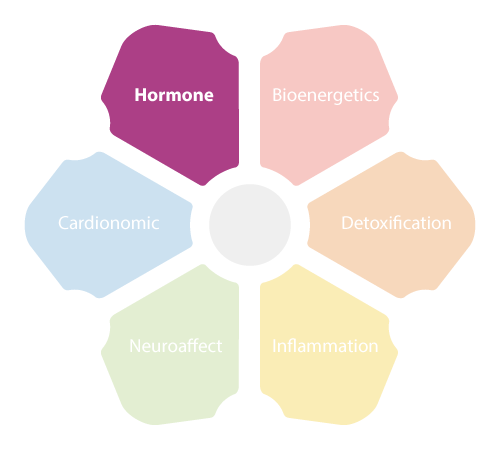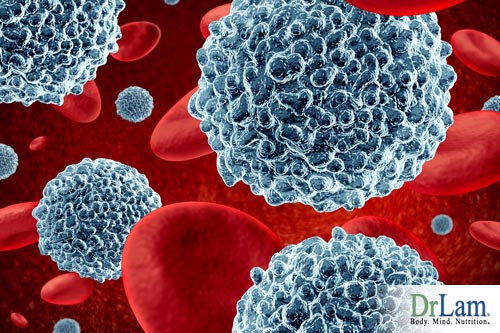
 Hashimoto's thyroiditis is an autoimmune condition where your immune system attacks your thyroid. When attacked, it becomes inflamed and gradually deteriorates, which decreases its ability to produce enough thyroid hormones. It is the most common cause of hypothyroidism, with around 10 million people affected in the US alone. It affects women between 10 and 20 times more than men, and it usually appears between the ages of 30 and 50, though it can also affect children.
Hashimoto's thyroiditis is an autoimmune condition where your immune system attacks your thyroid. When attacked, it becomes inflamed and gradually deteriorates, which decreases its ability to produce enough thyroid hormones. It is the most common cause of hypothyroidism, with around 10 million people affected in the US alone. It affects women between 10 and 20 times more than men, and it usually appears between the ages of 30 and 50, though it can also affect children.
Thyroid hormone is essential for the regulation of metabolism, basal body temperature, the use of energy, body weight, cholesterol levels, breathing rate, heart rate, and the functioning of the muscles, brain, and pretty much all your other organs and cells.
Thyroid hormone is secreted by the thyroid gland, goes into the bloodstream, and then gets distributed to almost every cell in your body. Your cells need thyroid hormones to regulate their metabolism. So if for some reason your thyroid function is slowed and it can't produce the amount of thyroid hormones your cells need, your metabolism takes a direct hit. Symptoms of hypothyroidism include:
These symptoms are very similar to those of Adrenal Fatigue Syndrome (AFS), a condition where your adrenal glands are overworked secreting more cortisol than average to combat stress. This usually happens when you undergo chronic mental or physical stress, such as issues at home or an extended illness.
Symptoms of AFS include fatigue, weight gain, hair loss, dry skin, PMS, infertility, lowered immunity, low libido, anxiety, mild depression, heart palpitations, constipation, insomnia, food and drug sensitivities, intolerance to stress, and brain fog.
The reason the symptoms of these two conditions are similar is because the thyroid and the adrenals are intimately linked. In fact, they are both parts of the hormone circuit of the NeuroEndoMetablic (NEM) Stress Response. The NEM is a network of organs and systems that work together to fight stress. It is divided into six circuits: the hormone, the bioenergetic, the cardionomic, the neuroaffect, the inflammation, and the detoxification circuits.
Although all six circuits are affected by a slowed thyroid, since it is responsible for so much, the hormone circuit is the one that is most affected because the thyroid is one of its main components. Its other components are the adrenal glands and the gonads (male testes and female ovaries).
But before we get into the specifics of how the thyroid affects and is affected by these other hormone systems, let's take a more detailed look at how thyroid hormones work and how Hashimoto's thyroiditis affects them.
 The cells of the thyroid gland, called thyrocytes, produce the hormones T3 and T4 by combining the amino acid tyrosine with iodine they absorbed from the food you eat. That's why iodine deficiency is another common cause of hypothyroidism, especially in areas of the world where table salt is not fortified with iodine.
The cells of the thyroid gland, called thyrocytes, produce the hormones T3 and T4 by combining the amino acid tyrosine with iodine they absorbed from the food you eat. That's why iodine deficiency is another common cause of hypothyroidism, especially in areas of the world where table salt is not fortified with iodine.
Just like the adrenal glands, the thyroid gland will not secrete thyroid hormones unless given the signal to do so. This happens through the hypothalamic-pituitary-thyroid (HPT) axis. The hypothalamus secretes Thyrotropin Releasing Hormone (TRH) that signals the pituitary gland to secrete Thyroid Stimulating Hormone (TSH). TSH is what stimulates the thyroid gland into making T3 and T4. T3 is the active thyroid hormone, and T4 is its pro-hormone, meaning it is converted to T3.
These hormones are what we look for in blood tests when checking thyroid function. A blood test can tell us the levels of T3 and T4 in your system, and if they're low, it might indicate lowered thyroid function. A blood test will also tell us the level of TSH in your system, and if it is higher than normal, it means your pituitary gland is trying to stimulate a sluggish thyroid into producing more T3 and T4.
Both of these indicate signs of hypothyroidism. But, one more test should be done to check if Hashimoto's thyroiditis is the cause of the hypothyroidism, and that's an antibody test. This is necessary because Hashimoto's is an autoimmune condition, which means there is an abnormal production of antibodies in the system – specifically, thyroid peroxidase (TPO) antibodies. TPO is an enzyme in the thyroid that helps in the production of thyroid hormones.
In healthy individuals, a delicate balance between all the different hormones in the HPT axis is maintained in order for the thyroid to function properly. It starts with the control center in the brain, involving the hypothalamus and pituitary gland sensing how much thyroid hormones are needed, and then it signals the thyroid accordingly. If there is too little thyroid hormone, more TSH is released in order to stimulate the thyroid. If there is too much, TSH release is inhibited.
Sometimes, thyroid function is slowed not because of a primary cause, such as Hashimoto's thyroiditis, but due to a secondary factor, such as adrenal fatigue. In fact, adrenal fatigue and low thyroid function go hand in hand, because, as mentioned already, they are both components of the NEM's hormone circuit. When one dysregulates, the other follows.
The adrenal glands are part of the hypothalamic-pituitary-adrenal (HPA) axis, and they also get their signals from the hypothalamus and pituitary gland in the brain. If your system is exposed to stress, the hypothalamus tells your pituitary gland to secrete adrenocorticotropic hormone (ACTH), a hormone that stimulates your adrenals to secrete cortisol.
Immediately upon activation of the HPA axis, the HPT is also activated. The reason is that when you are facing a stressor, your body has to prepare you to deal with it. That involves releasing thyroid hormones to speed up your metabolic rate, heart rate, and breathing rate in order for your body to have the right amount of energy.
But, if your body is under constant stress, and your adrenals become weak, the thyroid will also weaken over time. As the thyroid slows down, so does your metabolism and the speed of your stress response.
Once the thyroid slows down and fatigue sets in, all non-essential functions begin to take a back seat. This includes reproduction. That's why symptoms of AFS and hypothyroidism include similar issues, like low libido, PMS, and irregular menstruation.
 In women, the ovarian adrenal thyroid (OAT) axis may dysregulate, and this can cause a lot of disruption in other hormone systems. Other than the symptoms just noted, things like afternoon slumps, hair loss, dry skin, brittle nails, intolerance to exercise, and intolerance to cold may pop up as well. If the dysregulation progresses, symptoms such as fibrocystic breast disease, amenorrhea, miscarriages, and infertility may occur.
In women, the ovarian adrenal thyroid (OAT) axis may dysregulate, and this can cause a lot of disruption in other hormone systems. Other than the symptoms just noted, things like afternoon slumps, hair loss, dry skin, brittle nails, intolerance to exercise, and intolerance to cold may pop up as well. If the dysregulation progresses, symptoms such as fibrocystic breast disease, amenorrhea, miscarriages, and infertility may occur.
The worse the dysregulation of the NEM stress response gets, the more your body will do what it can to conserve energy. This is why your thyroid will down-regulate in order to slow down your metabolism so it doesn't use up so much energy. This is actually a survival mechanism, even if it brings about undesirable symptoms. And it is often an overlooked root cause of hypothyroidism that can be managed naturally rather than through the use of thyroid hormone replacements.
So, if you have symptoms of hypothyroidism, you may want to keep the possibility of adrenal issues in mind while you are getting tested.
However, just as adrenal fatigue can trigger hypothyroidism, hypothyroidism can also trigger adrenal fatigue. If your thyroid is not functioning properly, that is also big stress on the body, and so your adrenals can become overworked trying to deal with that stress, and the rest of your NEM also tries to compensate for the loss of thyroid function. And whenever one hormone system goes out of balance, all others will be affected.
This is especially true with Hashimoto's thyroiditis since it is not usually identified in its early stages, it has often been going on for a long time before you see a doctor. And since you can't manage it by simply increasing iodine in your diet or by reducing stress, it can easily become a chronic physical stressor.
The exact causes of Hashimoto's thyroiditis are still unclear, but we do know that it runs in families. But having a genetic susceptibility does not automatically mean you'll get it. Environmental factors have to play a role in order for that susceptibility to develop into autoimmunity. Thyroid-specific genes like the thyroglobulin genes and the TPO genes, as well as immune-modulating genes, play a role.
Which specific environmental factors can turn this genetic susceptibility into a full-blown autoimmune condition is still being debated. Stress seems to be a big culprit, as it is in many other chronic and autoimmune conditions. The presence of other autoimmune disorders increases the risk as well, as does the presence of papillary thyroid cancer.
Hashimoto's thyroiditis is sometimes called chronic lymphatic thyroiditis because it causes the immune system to send lymphatic white blood cells to the thyroid, which then destroy the cells that produce T3 and T4. Over time, this can also cause the thyroid gland to enlarge, forming what is called a goiter, which is a swelling in the neck.
Hashimoto's thyroiditis is very slow in progression, and symptoms are rarely observable in the beginning stages of the condition. This is similar to how AFS progresses, with very mild and manageable symptoms at first that most patients and clinicians don't catch. It's only when it has progressed to more advanced stages that the symptoms become quite unavoidable.
Whether your hypothyroidism is caused by Hashimoto's thyroiditis or adrenal fatigue, there is a lot you can do to improve your state. If it caused by autoimmunity, then you can do a lot to manage it. If it is caused by AFS, you may be able to clear it up completely. Both require a holistic health plan.
 First of all, you should address any underlying adrenal fatigue. This includes eating an adrenal fatigue diet and also making sure you are getting enough iodine and other essential nutrients in your diet. It also includes managing stress through meditation, therapy, support, and any other methods you find relaxing. Gentle forms of exercise, such as adrenal breathing and adrenal yoga are great ways to relax and also slowly increase your strength.
First of all, you should address any underlying adrenal fatigue. This includes eating an adrenal fatigue diet and also making sure you are getting enough iodine and other essential nutrients in your diet. It also includes managing stress through meditation, therapy, support, and any other methods you find relaxing. Gentle forms of exercise, such as adrenal breathing and adrenal yoga are great ways to relax and also slowly increase your strength.
The fatigue that you are experiencing does require you to make time for a lot of rest and get good sleep. There's no point fighting it and trying to function at full capacity when it will only make your system weaken further. You may also consider supplements that can help the adrenal glands and the thyroid gland get stronger, but in this area, it is important to have expert guidance in order to avoid inadvertently worsen your condition.
Finally, with Hashimoto's thyroiditis, your doctor will likely recommend thyroid hormone replacement once the condition has gotten far enough along to cause unpleasant symptoms. It is still a good idea to do all of the above to support your health, though, even if you are taking thyroid replacement hormones. The more you make your wellbeing a priority, the better you will feel, no matter what state you're in.
For more information about hypothyroidism, Hashimoto's thyroiditis, or adrenal fatigue, the team at Dr. Lam Coaching can help. We offer a free, no-obligation phone consultation at +1 (626) 571-1234 where we will privately discuss your symptoms and various options. You can also send us a question through our Ask The Doctor system by clicking here.

Reclaim your energy with ThyroBlast!
Your hormone systems are all interlinked, and you can't have an issue in one area without the others being affected. Since Hashimoto's thyroiditis is very common, especially in women, it may be why your metabolism and reproductive health are taking a hit.